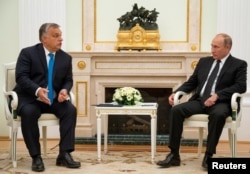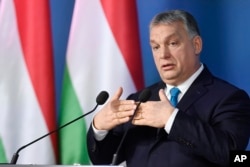Hungary’s prime minister Viktor Orban made his name as a young anti-Communist dissident delivering a fiery anti-Russian speech at the 1989 reburial of Imre Nagy, leader of the Hungarian revolt of 1956 against the Soviet Union.
Among the KGB officers dispatched by the Kremlin to help quash the Imre Nagy-led Hungarian uprising was Nikolai Kosov, a young intelligence officer, whose wife had given birth just a few weeks earlier to their first child, a son.
Fast forward more than half-a-century, and the son, also named Nikolai, was one of the first visitors earlier this year to Viktor Orbán’s new prime ministerial office in a former Carmelite Monastery overlooking the country’s parliament. There the two — the onetime dissident and son of a legendary Communist spy — discussed the relocation to Budapest of a Russian bank, itself steeped in Cold War history.
Kosov was handpicked in 2012 to head the bank by Russian leader Vladimir Putin.
Now known as the International Investment Bank, formerly as Comecon, or the Council for Mutual Economic Assistance, the Russian-controlled financial institution is obscure and has a small-scale balance sheet of a mere $350 million. But its planned move to Budapest has become the latest flashpoint in an increasingly strained relationship between the Hungarian government and Washington.
In mid-February, during a visit to Budapest, a delegation of four U.S. lawmakers raised the proposed relocation with Hungarian officials. And it featured in talks a few weeks earlier between U.S. Secretary of State Mike Pompeo with Hungarian ministers, too, say U.S. officials.
U.S. and Western European officials have become frustrated with Orban’s pivot east and his burgeoning friendship with Putin, seen as an alliance between two emblematic nationalistic strongmen. Both have reshaped their countries’ political systems and echo each other in their condemnations of Western liberalism. Orban has criticized Western sanctions on Russia and he welcomed Putin to Budapest after the 2014 Russian annexation of Crimea, bucking the West’s diplomatic isolation of the Russian leader.
The IDP’s relocation is seen by U.S. and Western European officials as another chapter in the unfolding ‘special relationship’ between Orban and Putin, a relationship that’s turned Hungary into Russia’s best friend in Europe, say analysts.
The partnership between the Hungarian leader and Putin has deepened since 2010, when Orban won re-election for the second time. Orban has cited Putin as a role model. And, according to opposition lawmaker Agnes Vadai, vice president of the Democratic Coalition, “he has mirrored what Putin has been doing as far as rule of law and democracy is concerned.” She adds: “He has basically copied Putin when it comes to curtailing civil society, suppressing and threatening NGOs he doesn’t control.”
In 2014 Orban signed a controversial $12 billion loan deal with the Kremlin to upgrade a Soviet-era nuclear power plant in Paks, a hundred kilometers south of Budapest. The contract was awarded without any counter-bids and the details were classified until a court ordered the government to divulge them.
The historical irony of the antecedents of the soon-to-be-relocated bank’s president, Nikolai Kosov, isn’t lost on Western security officials.
Kosov’s family ties with Russian intelligence — his mother was a handler of American nuclear spies — are jarring and they’re adding to the alarm that the bank could easily be used for illicit purposes and cover for espionage operations — not necessarily in Hungary, but elsewhere in Europe.
The Hungarian government is granting the IDP full diplomatic immunity, something neighboring Slovakia refused when Russia broached the possibility previously of moving the bank’s headquarters to Bratislava. Under the agreement with the Hungarian government, the immunity will extend not just to top IDP officials but all employees and consultants, as well as any guests the bank invites from Russia or third countries.
Andris Dezso, an investigative reporter at the independent news outlet Index, says that means after having arrived in Hungary IDP staff and their guests will have free movement within Europe’s Schengen area. And this at a time that Russian intelligence agencies are thought to be suffering an agent shortage across the continent thanks to the mass expulsion last year of suspected Russian spies, a punishment for the alleged Kremlin-ordered poisoning in England of double agent Sergei Skripal and his daughter.
Hungary’s counter-intelligence agency won’t have the manpower, Dezso says, to monitor the comings and goings. That will likely prompt other European counter-intelligence agents to start focusing on Hungary. “Counterintelligence units from abroad will come to Hungary and it will become like Vienna was during the Cold War,” he says, in reference to Vienna’s legendary status as a European hub for espionage skulduggery.
The bank’s financial transactions won’t be monitored either. “So it can do any kind of business,” complains Agnes Vadai, She added: “When the law about the headquarters agreement was in the parliament, in front of the parliament, we voted against it. We are very worried about this investment bank.”
VOA requests for interviews to discuss the bank with Orban’s press spokesman as well as Hungary’s foreign minister were declined.
In a press statement, the IDP has denied Nikolai Kosov has any links to Russian intelligence and rejects being described as Russian, insisting it is a multilateral finance organization established by several sovereign states.
“The relocation of the Bank’s headquarters to the European Union will enable growth in the Bank’s capital, will provide for a further increase in the Bank’s lending and investment activities, will lead to a decrease in the Bank’s cost for funding, will raise brand awareness of the Bank and create opportunities for attracting new shareholders to the Bank,” it said.
Bulgaria, the Czech Republic, Hungary, Romania, and Slovakia (all EU and NATO members), in addition to Mongolia, Vietnam and Cuba are also members of the bank. But the bank worried Orban enough in 2000 during his first administration to end Hungary’s membership of the IDP, only to rejoin more than a decade later. Orban at that time complained about the bank’s lack of transparency.
Julius Horvath, a professor at the Central European University, says the security background of the IDP’s president isn’t unusual for Putin’s Russia, where “people coming from security services, or as they call them siloviki, are appointed to government posts and in business.”
But he says the bank’s welcome in Budapest — the timetable for the relocation hasn’t been announced — is yet another sign of the warming ties between Orban and Putin. He doesn’t think, though, that the political friendship is based on any real ideological affinity, but more on the Hungarian leader’s reassessment of the balance of power in Europe and a perception of Russia’s growing clout in the region.
Gergo Nyilas, a journalist at Index who writes on Hungarian-Russian relations agrees. “If you ask me whether the Hungarian government wants to transform Hungary into an instrument of Russian influence then I would say, ‘no.’ That is not Hungary's intention. But if you ask me whether the government is playing a risky game that can lead to such a consequence, I would say, ‘yes.’”
Peter Kreko, an analyst at Political Capital, is also critical of Hungary's balancing act of being a member of NATO and the EU on the one hand and an ally of Russia on the other. He says Hungary could become a captured state.











